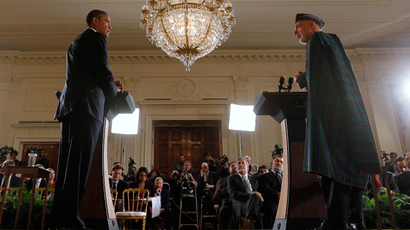State Department spent $50 mln on virtually invisible project in Afghanistan

A US government watchdog has found “serious deficiencies” in the awarding of a $50 million contract to promote the rule of law in Afghanistan.
The State Department awarded the Rome-based International Development Law Organization (IDLO) $50 million for the Afghanistan Justice Training Transition Program, which is meant to promote the rule of law. But the award does not contain sufficient oversight requirements and the organization may be ill-prepared to handle the taxpayer funds. IDLO received the contract without facing any competition.
In an “alert letter” sent to the State Department on Monday, John Sopko, the Special Inspector General for Afghan Reconstruction (SIGAR), said that the organization refuses to tell US investigators how the money is being spent.
An audit of legal programs administered by the State Department found that $47.8 million in taxpayer dollars went to the development organization, even though the contract was lacking “basic provisions that would allow (the State Department) to ensure proper monitoring and evaluation," the letter said.
“The irony here is that State violated its own written policy and gave them a huge check to teach the Afghans about the ‘rule of law,’” Sopko wrote. “We’re going to get to the bottom of this and hold people accountable.”
The special inspector general also urged the State Department to seek immediate transparency to ensure that the award “does not turn into a blank check, even if that means renegotiating the current agreement to provide for proper oversight.”
The contract is part of a program to help Afghanistan become self-sufficient through regional training, as well as by implementing a case management system and establishing the Afghan government’s justice sector ministries.
The program has only been in place for about six months, but SIGAR auditors claim that IDLO has refused to submit to “repeated requests for information regarding its budget, organizational structure and financial relationship with the US government. IDLO has also refused to provide complete copies of the materials it uses to help train Afghan justice-sector officials under its award.”
State Department deputy spokeswoman Marie Harf told AP that there has been no evidence that the money is being wasted, but she supports Sopko’s intentions to verify this through greater oversight.
"While this program is new, there have been no allegations or evidence of fraud, waste or mismanagement of the Justice Training Transition Program, and there is a robust oversight in place for it...through our daily contact with the implementers on the ground," she said.
Sopko’s letter comes at a time when the State Department is already under fire for failing to correctly audit about $315.3 million in Afghanistan reconstruction contracts. The State Department has awarded 140 contracts of at least $1 million for Afghan reconstruction since 2002, only 41 of which were audited, SIGAR reported earlier this month. The other 99 were left unaudited, which may have weakened the oversight of many of its programs.
As the US scales back its troops ahead of the 2014 withdrawal from Afghanistan, lack of oversight could result in more wasteful spending. The Pentagon has already come under fire for wasting $34 million on an unused building in southwestern Afghanistan, and both the Pentagon and State Department have abandoned projects which they spent significant sums of taxpayer funds on.














